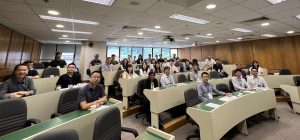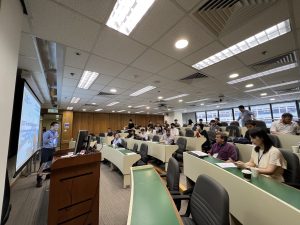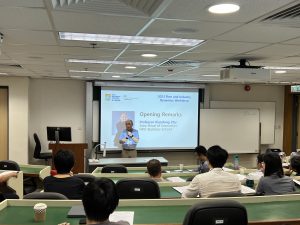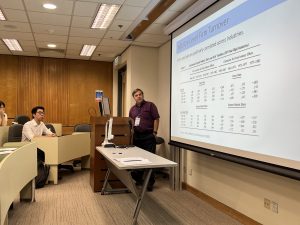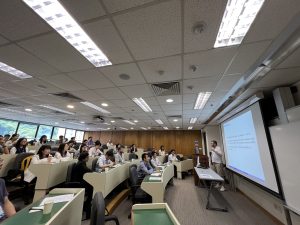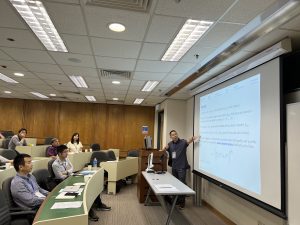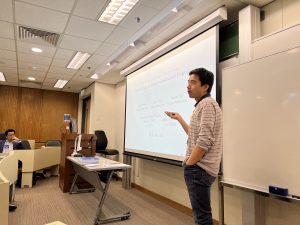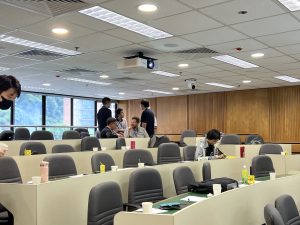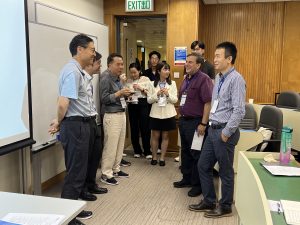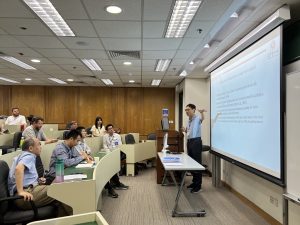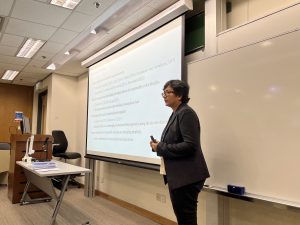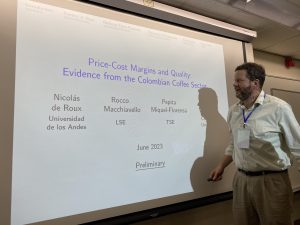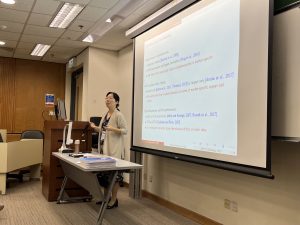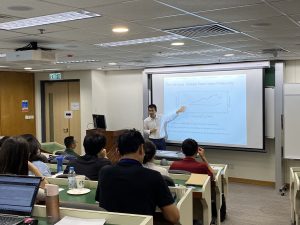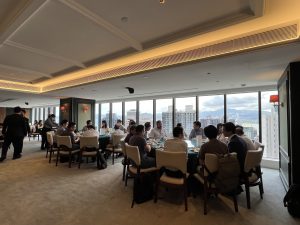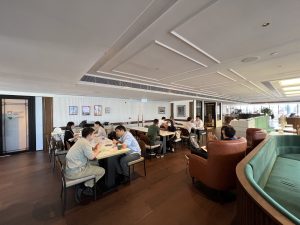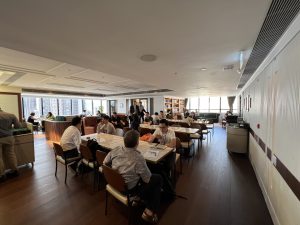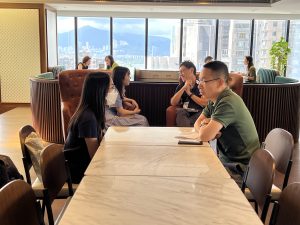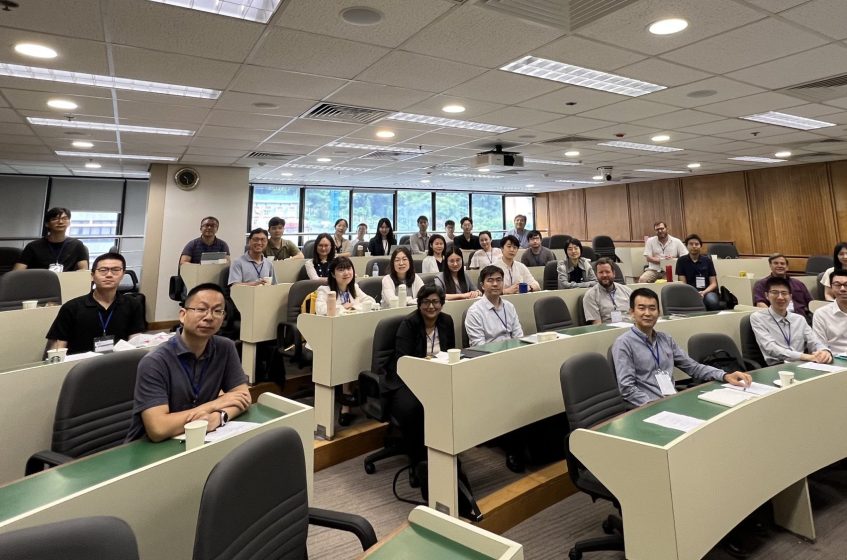
2023 Firm and Industry Dynamic Workshop
The 2023 Firm and Industry Dynamic Workshop had hosted around 80 world-leading economic scholars and research students in highly intellectual stimulating discussion on June 26 and 27, 2023, on HKU’s Main Campus.
The two-day workshop was co-organised with the Economics Area of HKU Business School, Economic Strategy and Development Research Centre of HKU Shenzhen Research Institute, and UNSW Business School, and sponsored by the HKU Business School’s Institute of China Economy. The Workshop brought together leading scholars and researchers from around the world to discuss the latest trends and insights in the areas of firm and industry dynamics, to foster the research on firms heterogeneity and industry upgrading and economic growth.
The participants of the Workshop had the opportunity to engage in dynamic dialogues and knowledge exchange with the authors from around the world of 10 carefully selected research papers under the umbrella theme over one and a half day. The organiser has made a creative and valuable arrangement for the junior researchers and research students to have focused discussion with the world-class scholars in the afternoon of Day 2, which were highly commended by both the scholars and the junior researchers.

Opening Remarks by Professor Xiaodong ZHU, Area Head of Economics, HKU Business School

Special Lecture by Professor Mark ROBERTS, The Pennsylvania State University
“Firms and industrial dynamics: Literature and Perspective”
Chair: Hongsong ZHANG, HKU Business School
Professor Mark Roberts of PennState delivered a special lecture of the key issues of the Workshop’s theme. He summarized past research achievements and future development directions in the field of firm and industry dynamics for the audience. He began by introducing the towering figure in the field of industrial organization, Zvi Griliches, and his outstanding contributions in the estimation of production functions, R&D and innovation, and price estimation. Next, he summarized important research findings in other data-driven research areas, such as how technology, demand, and market power lead to heterogeneity in firm performance. Finally, Professor Roberts offered a perspective on the future development of the field of firm and industry dynamics, focusing on aspects such as industry heterogeneity and endogenous firm selection.
Link to Download Professor Mark Roberts’s Presentation*
Link to Download the Bibliography of Professor Mark Roberts’s Presentation*
Chair: Chang SUN, HKU Business School

Professor Frederic Warzynski of Aarhus University introduced his latest research findings on the estimation of markups in multi-product firms in the presentation. The size of the markup is determined by the ratio of a firm’s product price to its production cost and is an important indicator of a firm’s market power. However, since it is often not directly observable in the data, estimating markups has always been a challenging direction for economists. Professor Warzynski provided two novel methods for estimating markup indices for firms. He applied his research to the Belgian bread and cake industry and obtained reasonable estimation results in both applications. Based on these results, Professor Warzynski found that the deregulation of prices was associated with a significant improvement in quality and efficiency. At the same time, welfare increased through an increase in both consumer and producer surpluses.
Link to Download Professor Frederic Warzynski’s Presentation*

Dr Shengyu Li, Senior Lecturer of UNSW introduced the research on the relationship between productivity and product quality in multi-product firms in his presentation. In their study, Dr Li and his co-authors used firms’ optimal decision-making in maximizing profits by balancing the sales of different products to overcome the challenges in estimating demand functions, breaking through the bottleneck of previous research. They then applied this method to the study of Mexico’s three large manufacturing industries. They found that core products in multi-product firms have higher productivity and quality, but improving product quality comes with corresponding costs. At the same time, firms can leverage their multi-product advantage for internal resource reallocation to reduce the costs of improving quality and enhance quality-adjusted productivity.
Link to Download Dr Shengyu Li’s Presentation*
Daniel Yi XU, Duke University
“Regulating conglomerates in China: Evidence from an Energy Conservation Program”
Professor Daniel Yi Xu from Duke University introduced the research on how China regulates conglomerates. Professor Xu and his co-authors thoroughly examined the behavior of firms in the context of China’s energy conservation program and found that under regulation, firms generally choose to reduce production rather than adopt the policy’s intended solution of improving production efficiency. During the regulatory process, conglomerates also conduct the strategy of transferring production to related parties to mitigate the impact of regulation. They also discovered that unregulated firms can benefit from regulation. Based on these observations, they built a model and structurally examined the policy effects. The final results show that the shifting production lowers the shadow cost of the policy. Additionally, they found that the government can improve regulation by targeting conglomerates, and the conglomerate regulation can increase energy savings, accompanied by the imposition of energy taxes.

Hong MA, Tsinghua University
“Super Factory Comes to Town: Identifying the Agglomeration Spillovers from Foxconn Factory in Henan”
Professor Hong Ma from Tsinghua University presented his research on the agglomeration spillover effects of the Foxconn factory in Henan. Professor Ma first discussed the importance of Foxconn in China and reviewed the background of Foxconn establishing the factory in Henan. Subsequently, Professor Ma explained how they used a geographic difference-in-differences approach in their paper to identify the agglomeration spillover effects caused by Foxconn’s establishment of the factory in Henan. They found that the closer a location is to the Foxconn factory, the higher the growth rate of output per worker. Based on their observations, they constructed a quantitative spatial model that included agglomeration forces and calibrated and estimated the parameters in the model using the causal evidence they observed. Through the model, they discovered that Foxconn has a significant and positive impact on local manufacturing employment and productivity.
Professor Hong Ma welcomes interested parties to contact him by email to request for the details of this research.

Arpita CHATTERJEE, IIM Bangalore and UNSW Sydney
“Food, Fuel, and Facts: Distributional Effects of External Shocks”
UNSW’s Associate Professor Arpita Chatterjee presented her and her coauthors’ study on the effect of external shock on households’ consumption in the context of emerging market economies. Using monthly panel consumption and income data on Indian households from 2014 to 2019, they found that the dynamic consumption effect of global food and oil price shocks varies across the income distribution of households in India. The rise in food prices has negative effects throughout the income distribution but hurts the lower income decile the most. Meanwhile, an increase in global fuel prices hurts both the lower and the middle-income classes, with minor effects on the top income decile. To better understand the mechanisms behind these effects, the authors assess the relative price channel and the income channel. Overall, this study sheds light on the differential effects of external shocks on household consumption in emerging market economies.
Dr Arpita Chatterjee welcomes interested parties to contact her by email to request for the details of this research.

Keynote Speech by Eric VERHOOGEN, Columbia University
“Price-Cost Margins and Quality: Evidence from the Colombian Coffee Sector”
Chair: Shengyu LI, UNSW Sydney
Can agricultural producers benefit by producing higher-quality products? In their paper, Professor Eric Verhoogen of Columbia University and his coauthors answer this question by studying the relationship between quality and price-cost margins in the Colombian coffee sector. The authors find that higher-quality beans carry larger price-cost margins, indicating that producers may benefit from improving quality. However, the cost of production does not increase with higher quality, as long as the beans meet the minimum export quality. The authors construct a model of intermediaries with two-sided market power to investigate the factors contributing to these price-cost margins. They find that the margin for the lower quality category is largely explained by markup, while for the high-quality category, both markups and markdowns are higher. The study suggests that increasing competition in the input market may have positive consequences for producers, as the quality premiums are only partially passed through to them.
Professor Eric Verhoogen appreciates the keen response from the audience. Considering the research project is at preliminary stage, it is not an opportune time to circulate the research at present.
Session 3: Output Quality, Trade, and Industry Dynamics
Chair: Haishi Harry LI, HKU Business School
Yao Amber LI, The Hong Kong University of Science and Technology
“Bilateral Economies of Scope”
Output exporting and input importing are associated with fixed cost. HKUST’s Associate Professor Yao Amber Li and her coauthors argues that firm’s decision on where to sell goods and where to source inputs are interdependent. Using a data-set of Chinese manufacturing firms, Dr Li and her coauthors document that firms export (import) from a country are more likely to import (export) from the same country, which is referred as bilateral economic of scope channel. They construct a theoretical framework that jointly considers firm’s export and import decision and estimate the magnitude of this channel. Results of the quantitative analysis suggest that considering the market-specific bilateral economic of scope is crucial in understanding observed trade pattern and analyzing trade liberalization effect.
Dr Yao Amber Li welcomes interested parties to contact her by email to request for the details of this research.
Hongsong ZHANG, HKU Business School
“Tax Policy, Selling Expenses, and the Growth of Young Manufacturing Firms: Evidence from a Tax Incentive Policy”
Associate Professor Hongsong Zhang of HKU Business School and his coauthor seek to understand the role of demand factors in driving the growth of young firms. They analysis the impact of a pre-tax deduction policy reform in China that reduces the costs of selling expenses of qualified young firms. They find that the pre-tax deduction policy increases the selling expenses ratio of qualified firms, which in turn improves firms’ output demand. This increase in demand further translates to an increase of gross profit rates. The authors build a model to characterize firms’ production decisions and dynamic decisions on selling expenses and R&D investment. Their estimation results show that while the productivity of an average firm is generally stable over its age, young firms have much lower demand factors. The age-based performance gap between young and mature firms is primarily driven by demand-side differences, rather than productivity as is often assumed in the literature.
Dr Hongsong Zhang welcomes interested parties to contact him by email to request for the details of this research.
Concluding remarks for in-room sessions: Hongsong ZHANG, Associate Director, Institute of China Economy, HKU Business School
*The copyrights of the presentations and related document belong to the respective author(s). The versions updated in this page would be subject to further edits and updates, please consult the author(s) for the latest versions and all other research-related enquiries.









